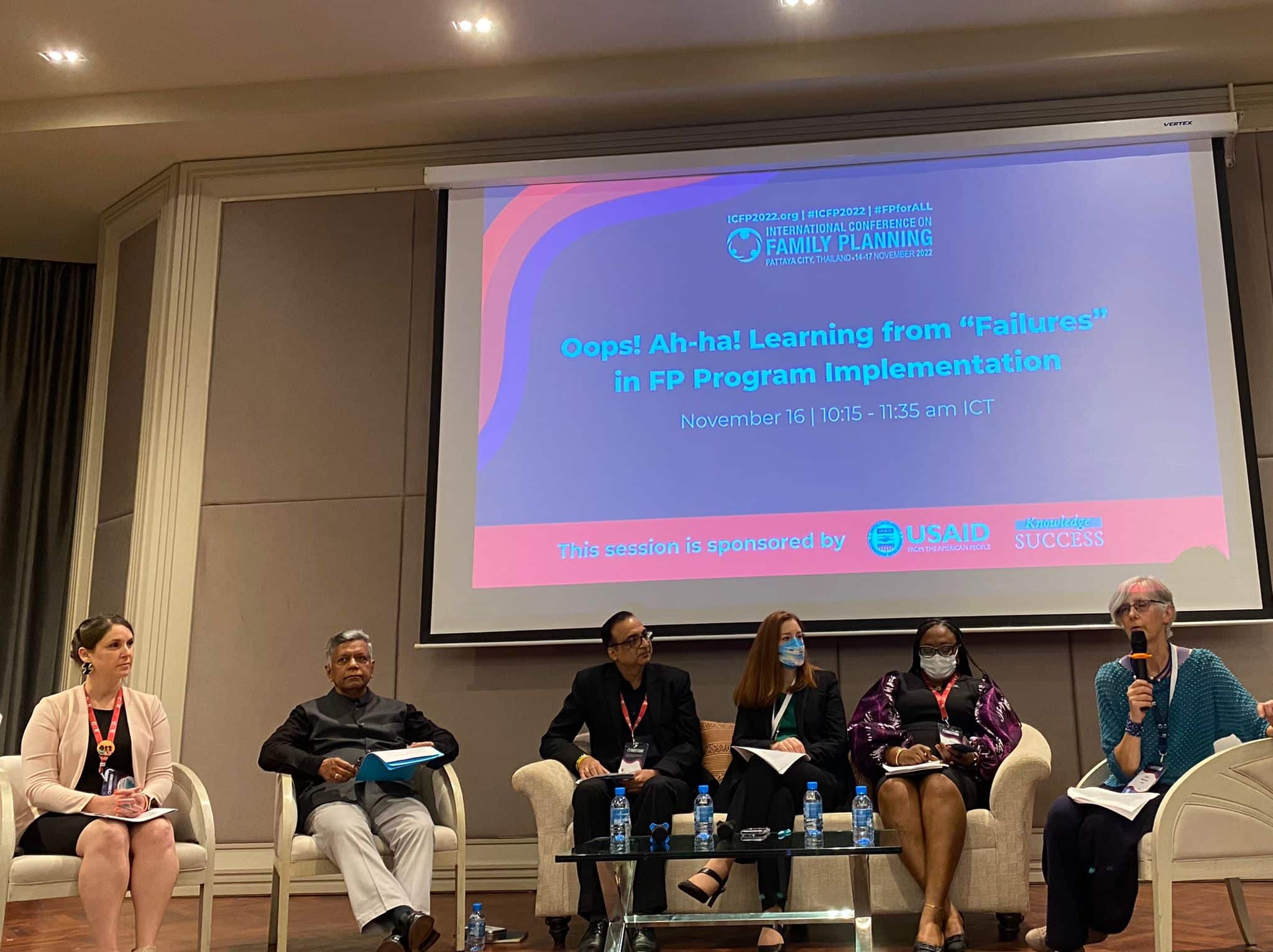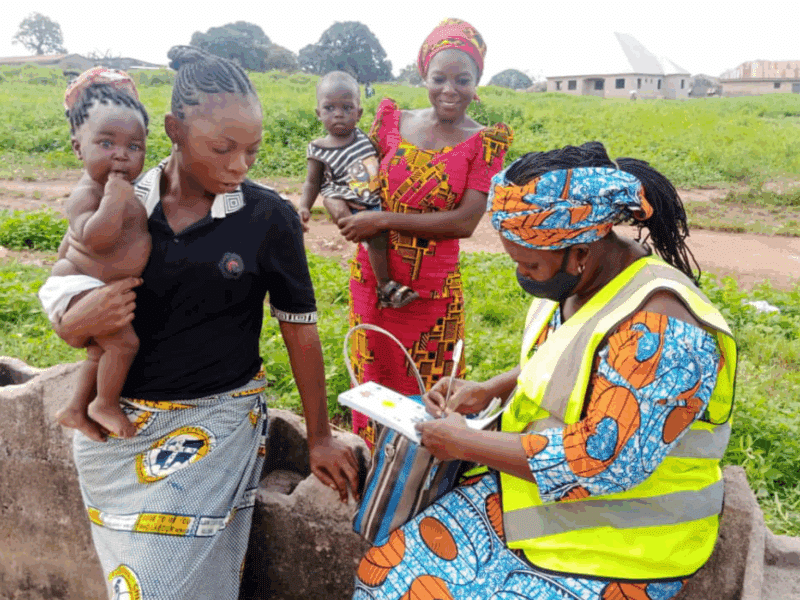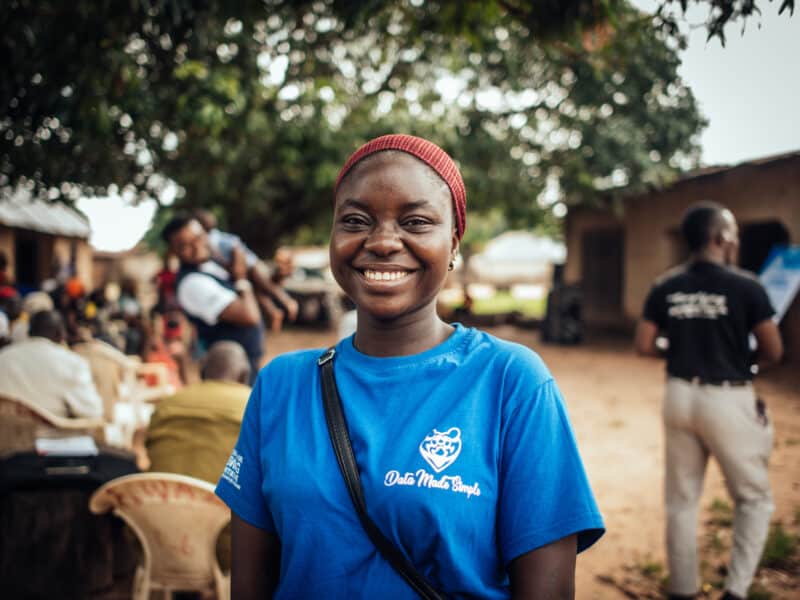One of the more difficult things to do in life is to admit failure.
Even harder is sharing your failures with other people.
On Wednesday morning at the 2022 International Conference on Family Planning in Pattaya, Thailand, five leaders in family planning and reproductive health shared stories of failures from their work with a room full of people in the hope that their setbacks could provide teachable moments to others and lead to future success.
They gathered for a “learning through failure event,” sponsored by USAID and the Johns Hopkins Center for Communication Programs-led Knowledge SUCCESS project.
“It may not be something people really like to admit, but failures happen,” said Ellen Starbird, director of USAID’s Office of Population and Reproductive Health. “Our experiences with failure give us some of the greatest insights into how we can improve programs and services, but they aren’t often shared.
“What we are all trying to do … is help normalize the sharing of failures – not just successes. Talking about what didn’t go well can help us make course corrections, plan more effectively, and ultimately strengthen family planning and reproductive health programs around the world.”
CCP’s Anne Ballard Sara, a senior program officer with Knowledge SUCCESS, says that while talking about failure can “help avoid repeating costly mistakes,” she recognizes there can be stigma attached to it. Programs always run the risk of falling short when they try something new and innovative, she said, and the goal of sharing failures is to turn unpredictable, but intelligent, ones into more manageable ones that can be predicted – and prevented – the next time around.
Gwyn Hainsworth, a senior program officer on the family planning team at the Bill & Melinda Gates Foundation, told a story of one of her earliest investments in a program designed to address provider bias against adolescents seeking family planning services and products. As part of the intervention, the team needed to gather information about the current state of the quality of services for young people. They needed a reliable, credible, scalable data system and gathering this data via a digital platform seemed like a commonsense approach.
First, they started by using an audio survey on an unsupervised tablet, where young people would go answer questions after their appointments in a private space to give honest answers. The key problem there, she said, was that some providers were actually gaming the data, answering surveys themselves to receive high marks. There were also issues related to IT, cost, security and maintenance of the tablets.
Then they tried interactive-voice response. And text messages.
“Ultimately, digital means of data collection were not going to work,” Hainsworth recalled. Young people had concerns about privacy, language barriers and low health literacy, along with mistrust of the reliability of technology.
In the end, they went with something decidedly low-tech and not scalable: A young person was hired for each health facility to gather the data one on one.
“It’s difficult for an implementer to tell a donor that [something] is not working,” Hainsworth said. “It took courage. I told my story to inspire donors and implementing partners to be honest when things aren’t working so we can pivot more quickly.”
Gertrude Odezugo, senior reproductive health manager at USAID Nigeria, learned early on in a project that dispensed contraception at private health facilities that it’s best to include the proper stakeholders before the work begins, rather than see problems crop-up mid-stream.
Odezugo says it’s important to have a “process to sit back and figure out where you have gone wrong. … It’s much better to have a system where you can meet and come back, and course correct.”
The panelists all said they wished that academic journals, for example, didn’t only focus on successful interventions, but also on programs that didn’t work out as planned.
“It’s hard to get anything published unless it’s a success story,” Hainsworth said.
Chandra-Mouli who leads the work on adolescent sexual and reproductive health at the World Health Organization, wondered aloud whether donors should stop asking only for success stories to measure programs, but tales of failure as well, in order to learn from them. Lessons are lost if you only focus on success, he said. The scientific program at ICFP, he said, was filled with abstracts about what works in family planning – and not everything does right away.
“Why couldn’t there be sessions on failures?” he asked.
Added Hitesh Sahni, chief of party with The Challenge Initiative at PSI India: “We need to be aggressive in learning from failures.”
Starbird said it is time to rethink risk tolerance – and that includes accepting that some projects will fail. And that it needn’t be something to be afraid of.
“If you want to make progress, you have to make more room for risk,” she said. “We all want it to work in the end.”





